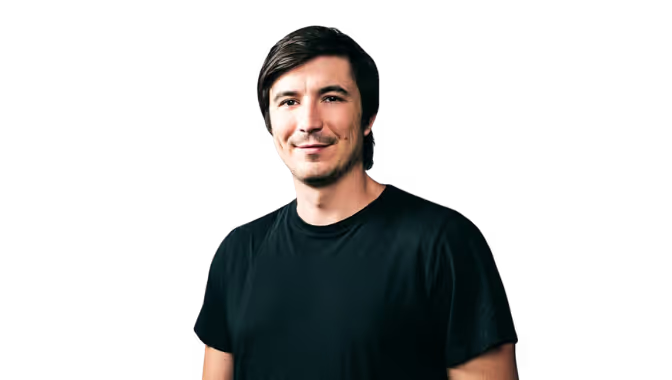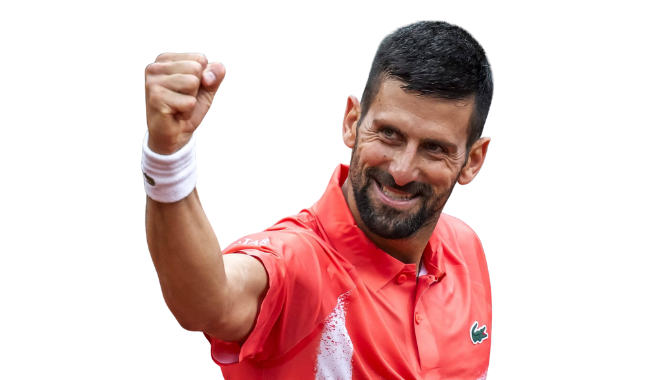

Jay Shetty & Vlad Tenev ON How to Start Investing Today
In this On Purpose episode, Jay Shetty sits down with Vlad Tenev, co-founder and CEO of Robinhood, best known for pioneering commission-free trading and making financial markets more accessible to everyday people. The entrepreneur openly discusses the early experiences that shaped his entrepreneurial mindset, including growing up during hyperinflation, learning to code, and investing in the stock market as a teenager.
What does it take to transform a childhood shaped by scarcity into a mission to democratize investing?
In this On Purpose episode, Jay Shetty sits down with Vlad Tenev, co-founder and CEO of Robinhood, best known for pioneering commission-free trading and making financial markets more accessible to everyday people. The entrepreneur openly discusses the early experiences that shaped his entrepreneurial mindset, including growing up during hyperinflation, learning to code, and investing in the stock market as a teenager.
A Childhood Shaped by Change
Vlad Tenev discusses with Jay Shetty his earliest memories of separation. Born in communist Bulgaria during the 1980s, he remembers the day he had to say goodbye to his father at the airport as he departed for the United States of America in search of a better life. The family lived separately for two years, living off limited resources, a reality that profoundly impacted young Tenev.
When the family finally reunited in the US, the entrepreneur felt disoriented and shy. Meeting his parents at the JFK Airport after years spent with his grandparents felt more surreal than comforting. He admitted that it was almost like meeting strangers. Although the time apart was difficult, Tenev used it as a lesson that would later shape his worldview.
Moreover, the entrepreneur revealed that growing up in an immigrant household, there was always an unspoken recognition of fragility and fleetingness. For his family, one missed chance could lead to deportation or financial ruin. All these thoughts intensified his sense of risk, which then became embedded in his identity.
The True Value of Money
On one of his trips back to Bulgaria in the mid-1990s, Tenev witnessed the devastating effects of hyperinflation. He told Jay Shetty that the exchange rate between the Bulgarian Lev and the US dollar soared, leaving his grandparents almost broke - the money they relied on monthly was now virtually worthless.
The entrepreneur's parents had to make daily choices regarding what they could afford. He told Jay Shetty that every day they had to choose whether to buy cheaper goods from discount stores or avoid unnecessary purchases, to make ends meet. So he grew up seeing money as more than a tool, but a means of survival. To Tenev, money became a symbol of safety and a source of independence. All these values (saving, cost effectiveness, and the risk of financial instabilities) would later form the philosophical core of Robinhood.
From ESL to Stanford
When Vlad Tenev first arrived in the US, he barely spoke English. He admitted to Jay Shetty that the new school environment left him confused, and he felt isolated. Unable to ask for basic necessities, such as a bathroom break, the entrepreneur had a difficult start. However, during a first-grade reading circle, he realized that he could read better than his classmates.
Tenev's parents saw his academic success as the only path to security because their entire existence in the United States depended on their ability to perform. So, they encouraged him throughout school, supporting him in skipping grades and enrolling in advanced math programs. Eventually, the entrepreneur enrolled in Stanford University.
Financial Awakening
Vlad Tenev's first hands-on exposure to investing began during the dot-com boom of the late 1990s. He created a virtual portfolio on Yahoo Finance, inspired by tech giants. Additionally, his parents offered an incentive for him to get high scores on the SAT by offering him real money to invest.
The entrepreneur scored 1370, and so he opened an E*Trade account with his father's help, and his first actual investment was in 3Com. The dot-com boom left a bitter experience, he admitted to Jay Shetty, as his initial portfolio plummeted, yet it sparked Tenev's passion for investment. Luckily, he started early, so he had enough time to recover from mistakes and learn through real-life investment experiences.
What started as a game (selecting stocks based on products he liked) turned into a valuable lesson for Tenev. He learned about shareholder voting, corporate governance, and market trends. This way, the world of finance became more attainable and later on led to the birth of Robinhood.
From Physics to FinTech
Vlad Tenev initially planned to pursue a career in theoretical physics, and so he enrolled in graduate school at UCLA. But he soon lost enthusiasm after reading The Mathematician's Survival Guide, a book that made him aware of the bureaucratic challenges in academia. He told Jay Shetty that another factor that contributed to his career change was the financial crisis of 2008.
Tenev's college friend and future co-founder, Baiju Bhatt, suggested starting a finance company during the peak of the crisis. Intrigued, Tenev dropped out of UCLA to venture into entrepreneurship. His main motivation was not money, as he explained to Jay Shetty, but a sense of purpose. He was excited to create something independently and creatively, which reflected the intellectual discipline found in mathematics and physics, yet with real-world impact.
The Birth of Robinhood
The name Robinhood was not the first choice. Tenev told Jay Shetty that his then-girlfriend and now wife used to refer to his work as Robin Hood-type finance whenever she had to explain it to her friends. The name resonated with him, especially since it differentiated the company from the classical acronyms of financial institutions.
Also, the name reminded the legendary outlaw, whose purpose is to help the less fortunate. Similarly, Robinhood's mission was to make finance accessible for everyone. espite facing early criticism from influential figures like Warren Buffet and Charlie Munger, Tenev believes the name's boldness helped make the brand unforgettable, as it stood for rebellion, fairness, and accessibility.
Lowering Barriers
One of Robinhood's significant innovations was eliminating trading fees and lowering account minimums to zero. Tenev told Jay Shetty that this changed the game for first-time investors who previously couldn't afford transaction fees. Robinhood's tech-based approach enabled scalability, allowing even $10 investors to participate meaningfully.
Another milestone was the introduction of fractional shares, which allowed users to invest any dollar amount in major stocks, making blue-chip companies accessible to everyone. Tenev told Jay Shetty that even prestigious shareholder meetings started to see attendance from Robinhood users who owned just fractions of a share.
The company's strategic moves weren't just technical innovations, but ideological shifts. By welcoming smaller investors, Robinhood openly challenged the industry's preconceived notions about who is entitled to accumulate wealth.
Investing Advice for Beginners
Vlad Tenev shared with Jay Shetty three common mistakes that new investors should avoid:
- Following trends online instead of doing personal research.
- Waiting too long to start.
- Not leveraging tools like fractional shares and ETFs.
The entrepreneur emphasized to Jay Shetty that people should invest in companies they know and trust, especially those whose products they actually use.
Robinhood has now introduced diversified portfolios for users who prefer a hands-off approach, aiming to make financial literacy and portfolio building more accessible. Investing in a skill is best learned through experience. Similarly to learning to play an instrument, it is about picking it up and practicing, not endlessly studying theory before producing your first note.
GameStop and Public Scrutiny
Robinhood was brought into the limelight during the GameStop incident. Vlad Tenev admitted that it was one of the most stressful experiences of his life, feeling like someone punching him in the face repeatedly. He understood that his public statements didn't resonate with his audience and that he came across as emotionless.
Learning from his mistakes, Tenev changed his leadership style following the scandal. Now, he values emotional connection and authenticity more, especially when trust is at stake. He understands that remaining silent during a crisis may be perceived as indifference. So, he told Jay Shetty that he is now committed to becoming a more visible and emotionally present leader.
Reinvention
Vlad Tenev’s most challenging period for Robinhood was the slow burn of 2022; after going public in 2021, the company dealt with a drop in user engagement due to rising interest rates. The macroeconomic shift forced Tenev to refound the company, refocus the strategy, diversify revenue streams and build new products such as retirement accounts and credit cards.
The entrepreneur shared with Jay Shetty an important leadership exercise he had to do, imagining what an external CEO would do differently. This way, he reversed the company's remote-first policy and refocused on high-value, active traders. Within six months, Robinhood managed to turn the ship around, achieving profitability and expanding its product range. Tenev added that this transformation was both strategic and cultural, with a new emphasis on power users.
Building Personal Resilience
The entrepreneur likes to keep up his levels of energy and mental clarity. He told Jay Shetty that he balances intellectual work (such as solving math problems) with strict workout schedules. Some of his habits include cold plunges, journaling, maintaining a disciplined sleep schedule, and setting boundaries with digital devices.
The entrepreneur also credited his wife, who is a stabilizing force in his life. Married for over a decade and father of multiple children, Tenev's personal life remains his core foundation. Professionally, he envisions Robinhood as continuing to evolve, integrating AI for financial advising, global international expansion, and preparing for the $72 trillion wealth transfer. With 23 million funded users and growing, Robinhood's mission remains to make finance accessible for everyone.
More From Jay Shetty
Listen to the entire On Purpose with Jay Shetty podcast episode “The Easiest Way to Start Investing Today— No Experience Needed (You Just Need $1!) with Robinhood CEO” now in the iTunes store or on Spotify. For more inspirational stories and messages like this, check out Jay’s website at jayshetty.me.
Sign up for the only email that puts purpose at the center of your day.




Looking for greater meaning? This quiz shows you how to live with purpose every day.
Take the Quiz
Dreaming of becoming a life coach? This quiz tells you if a coaching career is right for you.
Take the Quiz

Dreaming of becoming a life coach? This quiz tells you if a coaching career is right for you.
Take the Quiz

Everyone communicates differently. Discover your own personal fight style now.
Take the Quiz

Understanding your role in a relationship is the first step to making things work.
Take the Quiz

